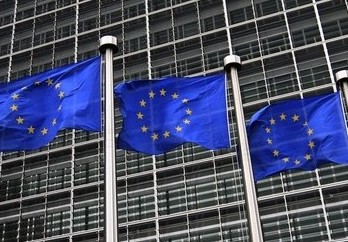The Brexit vote demands a rethink of Brussels’ strategies, Dutch papers say

The results of the British referendum on Europe dominated the front pages and editorials of Dutch newspapers at the weekend, as leader writers pondered what the vote means for the Netherlands and Brussels.
The Financieele Dagblad headlined its editorial on the Brexit vote ‘keep calm and carry on’, referring to the poster published by the British government in 1939 in the run up to the Second World War.
The only comfort to be taken from the British vote is that it is older English people who read newspapers who voted for Brexit and ‘they are both dying out’, the paper said.
The referendum is not only dividing Europe, but the United Kingdom as a whole, the paper said. ‘Politicians have to ensure a new way of enabling European cooperation in all its facets. And entrepreneurs should better demonstrate what the market and its potential value actually is.’
The Volkskrant said the lesson to be learned from the result is that ‘a better Europe’ rather than ‘more Europe’ is key.
The result, the paper says, is bad for Britain, bad for the Netherlands and bad for the European Union as a whole. The vote can be positive if it is seen as a wake up call for governments and the European commission. ‘They will have to be more creative to keep euroscepticism at bay,’ the paper said in its editorial.
More Europe
It would be wrong to regard the referendum as a British affair, based on their island mentality, the paper said. But it would be equally wrong to answer the result with ‘more Europe’ and a federation of nation states which are subservient to Brussels. ‘A deep, fundamental re-evaluation is necessary to prevent the unravelling of Europe,’ the Volkskrant concluded.
The NRC praised the way Brussels responded to the results of the referendum and said it is important that the European institutions emphasised the need for speedy decision-making.
At the same time, the EU has made it clear that it wishes to continue working closely with the Brits, the paper said. And, as the dust settles, it is clear that the result was just the latest in a string of wake-up calls for Europe.
Signals
‘The EU has not been blind to the signals it has had in the past few years and the current European commission has a much more limited role than earlier ones,’ the NRC pointed out.
‘The call by the Netherlands and others for the EU to limit its role to added value issues is beginning to take shape. But nevertheless, the EU is still being met by mounting scepticism,’ the paper concluded.
Commentator Syp Wynia said in Elsevier magazine that Brussels would be ‘extremely stupid’ if it ran away ‘again’.
Antipathy
The growing antipathy towards Europe – in almost every EU country – cannot be explained away without dealing with mass immigration, he said. The EU is forcing countries to accept migrants, the EU is growing ever bigger and everyone in the EU has the right to work in another country. This might be a good idea according to politicians and economists, but many folk see it differently, he said.
Geert Wilders is pressing for a referendum on whether the Netherlands should leave the EU, Wynia pointed out. The fact that the result could go in favour of a Nexit is an extra reason to be more critical of everything that comes out of Brussels.
‘It is high time not to join in all of the time, such as with European migration policy or the euro,’ Wynia said. ‘Sometimes, less is more.’
Neo-liberal poison
Now we have been freed from the grip of city bankers and their neo-liberal poison, there is an opportunity for the EU to win back the support of the ordinary voter, writes cultural historian Thomas von der Dunk in the Volkskrant.
In addition, the vote may now have proved the idea of ‘the markets’ wrong and the idea that the speculators in the City somehow had better gut feelings than anyone else, Von der Dunk wrote.
‘Perhaps now we will have an end to 30 years of over-estimating their capabilities… the chaps whose greed caused the 2008 credit crisis which placed all of European society in turmoil,’ he said. ‘It would be great if we no longer listened to the stock exchange gurus.’
And in terms of the EU, we should beware of exaggerating the consequences, he said. ‘Their windy little island will remain where it is and as long as they like our cheese, they will continue buying it.’
Thank you for donating to DutchNews.nl.
We could not provide the Dutch News service, and keep it free of charge, without the generous support of our readers. Your donations allow us to report on issues you tell us matter, and provide you with a summary of the most important Dutch news each day.
Make a donation